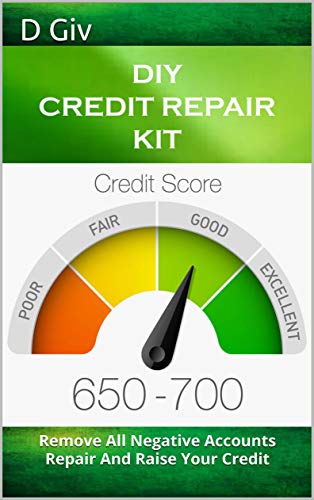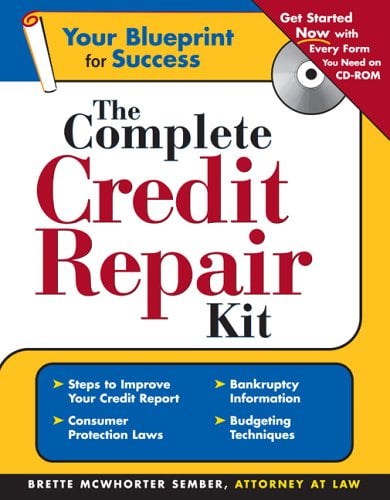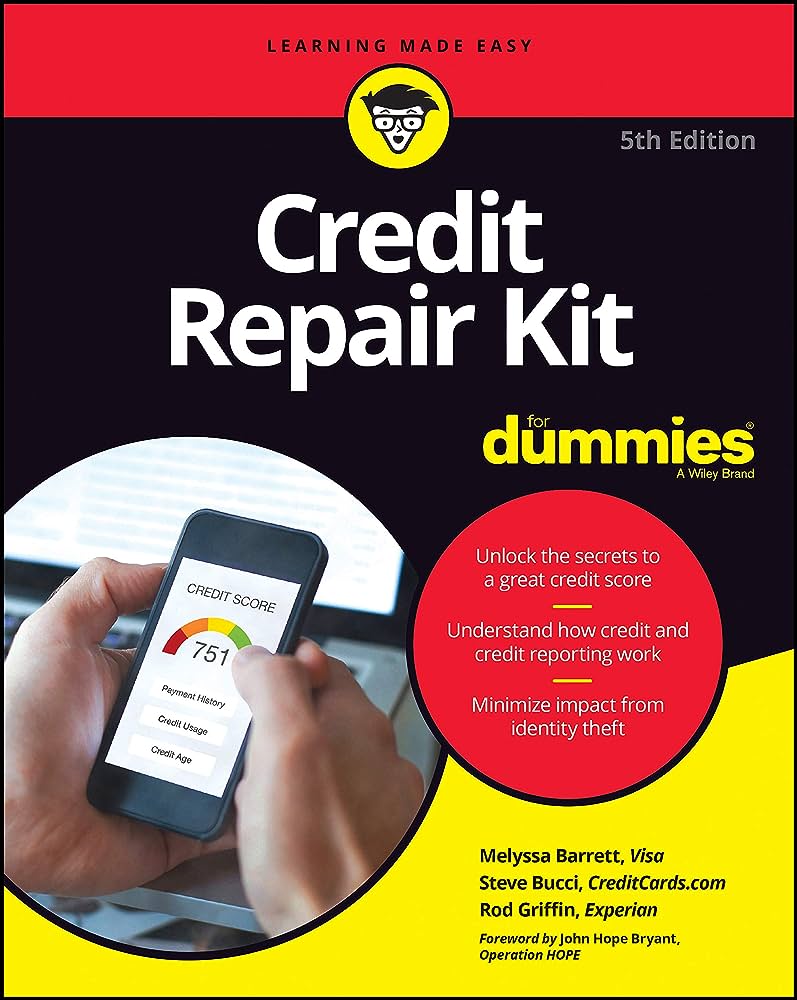In the realm of personal finance, few things hold more weight than one’s creditworthiness. Maintaining a solid credit score can open doors to favorable interest rates, loan approvals, and even employment opportunities. However, the journey to credit repair is often labyrinthine, with unfamiliar terminology, complex procedures, and an overwhelming amount of information. This article presents the “Credit Repair Kit,” a comprehensive resource designed to demystify the credit repair process, empower you with essential knowledge, and provide actionable steps to regain control of your financial standing. Embark on this informative journey and discover the tools you need to navigate the winding path toward credit restoration.
Understanding Credit Scores
What is a Credit Score?
A credit score is a three-digit number that represents an individual’s creditworthiness. It is a numerical reflection of an individual’s credit history and plays a significant role in determining their eligibility for loans, credit cards, and other financial opportunities. Lenders and creditors rely on credit scores to assess the risk associated with lending money to an individual. A higher credit score indicates a lower risk, making it easier for individuals to access credit at favorable interest rates and terms.
How is a Credit Score Calculated?
Credit scores are calculated using complex algorithms that analyze various factors related to an individual’s credit history. The most widely used credit scoring model is the FICO score, which ranges from 300 to 850. The factors that influence a credit score include:
- Payment history: The timeliness and consistency of your credit payments.
- Credit utilization: The percentage of your available credit that you are using.
- Length of credit history: The age of your credit accounts and how long you have been building credit.
- Credit mix: The variety of credit accounts you have, such as credit cards, loans, and mortgages.
- New credit applications: The number of recent credit inquiries and new accounts opened.
Each factor carries a different weight in the credit scoring algorithm, and understanding how these factors impact your credit score can help you make informed decisions to improve it.
The Importance of Credit Scores
Credit scores are vital in today’s financial landscape. They can have a significant impact on your financial well-being, affecting your ability to secure loans, obtain favorable interest rates, and even secure employment or housing. Lenders use credit scores to assess your creditworthiness and determine the amount of risk they are willing to take when lending you money.
A higher credit score translates to better financial opportunities and lower interest rates, potentially saving you thousands of dollars over time. On the other hand, a lower credit score can limit your options and result in higher interest rates or outright denials of credit applications. Understanding the importance of credit scores is essential for anyone looking to make sound financial decisions and improve their overall financial health.
Assessing Your Credit Report
Obtaining Your Credit Report
To assess your creditworthiness and identify any areas for improvement, you must first obtain a copy of your credit report. You are entitled to one free credit report per year from each of the major credit bureaus: Equifax, Experian, and TransUnion. To obtain your credit report, you can visit AnnualCreditReport.com, the official website authorized by the Federal Trade Commission.
Reviewing Your Credit Report
Once you have obtained your credit report, it is crucial to review it carefully for accuracy and completeness. Your credit report contains detailed information about your credit accounts, payment history, and any negative marks or discrepancies. Review each section of the report, paying close attention to any errors, unauthorized accounts, or missing information.
Identifying Errors and Discrepancies
If you identify any errors or discrepancies on your credit report, it is essential to take immediate action. Common errors can include inaccurate personal information, duplicate accounts, or accounts that have been incorrectly reported as delinquent. Discrepancies in your credit report can negatively impact your credit score, so it is crucial to dispute any inaccuracies promptly.
To address errors or discrepancies on your credit report, gather any supporting documentation that proves the information is incorrect. This may include payment receipts, account statements, or correspondence with creditors. Once you have gathered the necessary documentation, you can proceed with submitting a credit bureau dispute.
This image is property of target.scene7.com.
Creating a Credit Repair Plan
Setting Specific Credit Goals
When creating a credit repair plan, it is essential to set specific credit goals that align with your financial objectives. These goals may include paying off outstanding debts, improving your credit score, or establishing a positive payment history. Setting specific goals allows you to measure your progress and stay motivated throughout the credit repair journey.
Developing a Budget
A key component of a credit repair plan is developing a comprehensive budget. A budget helps you manage your finances effectively and allocate funds towards debt repayment and savings. Start by tracking your income and expenses, including fixed expenses like rent or mortgage payments, utilities, and loan payments. Identify areas where expenses can be reduced or eliminated to free up funds for debt repayment.
Establishing a Repayment Strategy
To address outstanding debts, it is crucial to establish a repayment strategy. Prioritize your debts based on factors such as interest rates and outstanding balances. Consider options such as the debt snowball method, where you pay off smaller debts first to gain momentum, or the debt avalanche method, where you tackle high-interest debts first. Select a strategy that aligns with your financial situation and goals.
Disputing Inaccurate Information
Identifying Inaccurate Information
When reviewing your credit report, you may come across inaccurate information that negatively impacts your credit score. This can include accounts that do not belong to you, late payments that were actually made on time, or debts that have already been paid off. Identifying inaccurate information is the first step towards correcting it and improving your credit history.
Gathering Supporting Documentation
To strengthen your case during the dispute process, it is crucial to gather supporting documentation that proves the inaccuracies on your credit report. This may include payment receipts, bank statements, or correspondence with creditors. The more documentation you have, the stronger your case will be when disputing inaccurate information with the credit bureaus.
Submitting a Credit Bureau Dispute
To dispute inaccurate information on your credit report, you can submit a dispute directly to the credit bureaus. Include a detailed explanation of the inaccuracies and provide any supporting documentation you have gathered. The credit bureaus are required by law to investigate your dispute within a reasonable time frame, typically 30 days. If the information is found to be inaccurate, it will be removed or corrected, leading to an improvement in your credit score.

This image is property of Amazon.com.
Negotiating with Creditors
Contacting Creditors and Collection Agencies
If you are facing financial difficulties and struggling to make payments, it is essential to proactively reach out to your creditors and collection agencies. Communicating with them gives you an opportunity to explain your situation and explore potential solutions. In some cases, creditors may be willing to negotiate payment arrangements, reduce interest rates, or waive certain fees.
Exploring Debt Settlement Options
In situations where you are unable to repay your debts in full, debt settlement may be an option to consider. Debt settlement involves negotiating with creditors to settle your debts for less than the full amount owed. This can be a viable solution for individuals facing significant financial hardships. However, it is important to understand the potential consequences, such as credit score impacts and potential tax liabilities.
Requesting Payment Plan Adjustments
If you are struggling to meet your monthly payment obligations, requesting payment plan adjustments from your creditors can provide temporary relief. This may involve extending the repayment term, reducing the monthly payments, or temporarily suspending payments. It is crucial to communicate your financial situation honestly and provide supporting documentation if possible.
Managing Outstanding Debts
Prioritizing Debt Payments
When managing outstanding debts, it is important to prioritize your payments. Focus on paying off high-interest debts first due to the cost of accumulating interest over time. Make at least the minimum payments on all your debts to avoid negative impacts on your credit score, but allocate any additional funds towards the highest interest debts. As you pay off one debt, shift the funds towards the next highest interest debt, creating a snowball effect.
Consolidating Debts
Debt consolidation can be an effective strategy for managing multiple debts. It involves combining multiple debts into a single loan with a lower interest rate, making it easier to manage and potentially saving you money on interest payments. Debt consolidation options include personal loans, balance transfer credit cards, or home equity loans. Consider the costs and benefits of each option before proceeding with debt consolidation.
Exploring Debt Relief Options
In severe cases where repayment is not feasible, exploring debt relief options may be necessary. This can include options such as debt management plans, debt settlement, or bankruptcy. Debt relief options should be considered as a last resort, as they can have long-term consequences on your credit history. It is advisable to seek professional advice before pursuing any debt relief options.

This image is property of Amazon.com.
Establishing Good Credit Habits
Paying Bills on Time
One of the most crucial habits to establish for good credit is paying your bills on time. Late payments can have a significant negative impact on your credit score and can stay on your credit report for up to seven years. Set up automatic payments or use reminders to ensure you never miss a deadline. Making timely payments demonstrates responsible financial behavior and can improve your creditworthiness over time.
Keeping Credit Card Balances Low
Another key habit to develop is keeping your credit card balances low. High credit card balances relative to your credit limit can negatively affect your credit utilization ratio, a significant factor in credit scoring models. Aim to keep your credit card balances below 30% of your available credit limit. Paying off your credit card balances in full each month can also help you avoid unnecessary interest charges.
Building a Positive Payment History
Building a positive payment history is essential for establishing good credit. It involves consistently making payments on time across all your credit accounts. Avoiding late payments and defaults demonstrates your ability to manage credit responsibly. Over time, a positive payment history can improve your credit score and increase your chances of being approved for loans and credit cards with favorable terms.
Utilizing Credit Building Tools
Secured Credit Cards
If you have limited or damaged credit, secured credit cards can be a useful tool to rebuild your creditworthiness. Secured credit cards require a security deposit, which becomes your credit limit. By making timely payments and keeping your balances low on a secured credit card, you can demonstrate responsible credit behavior to lenders. Over time, you may be able to transition to an unsecured credit card and access higher credit limits.
Credit Builder Loans
Credit builder loans are specifically designed to help individuals build or rebuild their credit. These loans require you to make regular payments over a specified period, establishing a positive payment history. The lender holds the loan funds in a separate account until the loan is repaid, mitigating the risk for the lender. At the end of the loan term, you receive the funds, along with an improved credit score if you made timely payments.
Authorized User Accounts
Becoming an authorized user on someone else’s credit card account can also be an effective credit building tool. When you become an authorized user, the account’s positive payment history is reflected on your credit report, potentially boosting your credit score. It is important to choose someone with good credit habits and ensure that their usage will not negatively impact your credit.

This image is property of i5.walmartimages.com.
Monitoring Your Progress
Tracking Credit Score Changes
As you implement credit repair strategies and develop positive credit habits, it is crucial to monitor your progress by regularly checking your credit score. Numerous websites and financial institutions offer free credit score monitoring services that allow you to track changes in your credit score over time. Monitoring your credit score enables you to identify areas for improvement and make necessary adjustments to your credit repair plan.
Keeping Tabs on Credit Repairs
After submitting credit bureau disputes or negotiating with creditors, it is important to keep track of the progress made on your credit repairs. Monitor your credit reports for any updates or corrections made based on your disputes. Persistence in following up on your credit repairs ensures that inaccurate information is promptly removed or corrected, leading to an improved credit score.
Reviewing Updated Credit Reports
Periodically reviewing your updated credit reports is essential for ensuring that your credit repair efforts are yielding positive results. Obtain updated copies of your credit reports from all three credit bureaus to verify that accurate information is being reported, inaccurate information has been removed, and your credit score has improved. Regularly reviewing your credit reports helps you stay informed about your creditworthiness and identify any remaining issues that may require attention.
Seeking Professional Help
Benefits of Credit Repair Companies
For individuals who are overwhelmed or lack the time and expertise to navigate the credit repair process on their own, credit repair companies can provide valuable assistance. These companies specialize in credit repair and have a deep understanding of the laws and regulations governing the credit industry. Their expertise can help streamline the credit repair process and increase the chances of successful outcomes.
Finding a Reputable Credit Repair Agency
When seeking professional help with credit repair, it is essential to find a reputable credit repair agency. Research different agencies, read customer reviews, and check their accreditations and certifications. Look for agencies that adhere to ethical practices, provide clear pricing information, and have a track record of helping clients achieve significant improvements in their credit scores.
Understanding the Cost of Credit Repair Services
Credit repair services come with associated costs. It is important to understand the fees and pricing structure of the credit repair agency you choose to work with. Avoid companies that charge upfront fees before providing any services, as this is prohibited by law. Transparent pricing and a clear understanding of the services included can help you make informed decisions about whether the cost of credit repair services aligns with your budget and goals.
In conclusion, understanding credit scores and taking proactive steps towards credit repair is essential for anyone looking to improve their financial well-being. Assessing and addressing inaccuracies in your credit report, developing a comprehensive credit repair plan, and practicing good credit habits are all crucial elements of the credit repair process. While credit repair can be a complex and time-consuming endeavor, the rewards of an improved credit score and enhanced financial opportunities are well worth the effort. Whether you choose to tackle credit repair on your own or seek professional help, the key is to stay informed, persistent, and committed to your long-term financial goals.

This image is property of Amazon.com.

